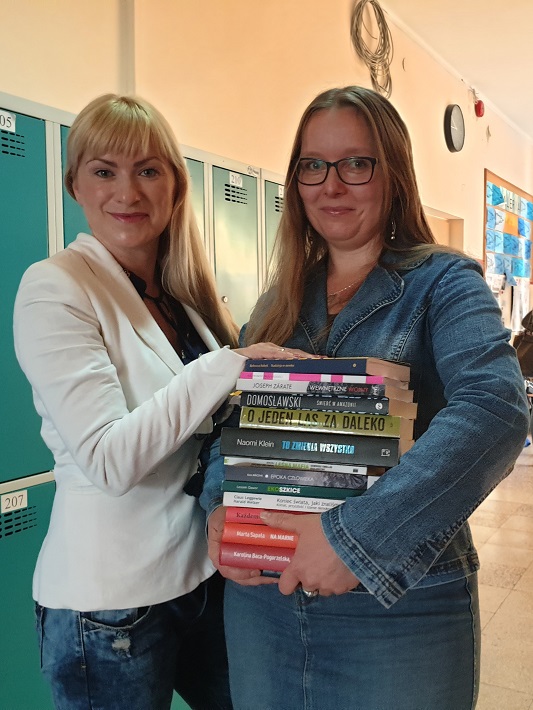| Magdalena Ochwat, PhD, and Anna Guzy, PhD |
It is already the third and last report regarding the most important representatives of the educational process – teachers, students, and parents – in the face of climate change. Earlier, in 2021, Magdalena Ochwat, PhD and Anna Guzy, PhD, from the Interdisciplinary Centre for Research on Humanistic Education conducted research on teachers, Polish philologists, and then elementary school students from 4th to 8th grades, and students from secondary schools.
On 22 April 2022, when a special holiday is celebrated – Earth Day, we present you with a report “Parents in the face of climate change” (download document – only available in Polish) which demonstrates how parents, the last element of the educational triad serving the role of co-participants and co-organisers of their children’s education, perceive the phenomenon of climate change, pro-ecological and pro-climate education.
Aims of the research
The aim of the conducted research was:
- Investigating ecological competence of parents of primary school students in grades 4–8 and parents of secondary school students.
- Collection of data including parents’ opinions on the implementation of climate education in schools attended by their children.
- Determining the attitudes of the surveyed parents towards the issue of the climate crisis.
- Understanding pro-ecological practices implemented in respondents’ homes.
- Getting to know the opinion of the respondents on whether the issue of climate change should be discussed at school. If yes – which subjects, in particular, should/need to be discussed in school according to parents.
- Collecting information about the sources of knowledge on the climate used by the surveyed parents.
303 parents of students from elementary and secondary schools from all around Poland took part in the main research conducted from February to the end of March 2022. 225 questionnaires were filled in and analysed in detail.
The main research tool was the questionnaire consisting of demographics and twenty-three questions. Fifteen of them were closed, while four were open. There were also four semi-open questions.
The questionnaire included questions focused on five subject areas:
- The parents’ ecological competence.
- The parents’ attitudes and actions towards the issue of climate change.
- Children’s involvement in action for climate according to the parents.
- The parents’ opinion regarding pro-climate education in schools.
- The parents’ opinion regarding optimal education on climate.
Research results
The vast majority of respondents possess up-to-date knowledge regarding climate change:
- The vast majority of respondents (92%, 206 people) agree that global warming, exacerbated by greenhouse gas emissions, is a fact. 3% of the respondents (8 people) believe that it is not true, while 11 people (5%) did not give a clear answer to this question.
- 95% of the respondents (213 people) believe that humans are responsible for climate change, and 5 parents (2%) gave a negative answer. 7 people (3% of respondents) did not give a clear answer to this question.
Pro-climate education in school in the opinion of parents:
- According to the vast majority of respondents, 97% (219 people), issues related to climate change should be discussed at school. Only 2% of respondents (4 people) have a different opinion. Two parents (1%) cannot answer this question unequivocally.
- Only 10% of the surveyed parents considered education on the climate crisis in schools as satisfactory. 23% (51 people) are not able to give a clear answer on this topic. 67% of the surveyed parents (152 people) are of the opinion that education on the climate crisis is not satisfactory.
- 203 people (90.22%) indicated that the subject of the critique of coal mining and the smog issue should be present in the lessons, 8 parents (3.55%) had a different opinion and thought this subject was not so important. 14 responding parents (6.22%) consider this topic to be moderately important.
What, according to parents, pro-climate education at school should look like?
- According to parents, environmental education should be practical and translate into the lives of students and their daily functioning. In their opinions, parents expressed the wish for their children to receive tips on specific activities and change of their daily habits to be more eco-friendly.
- Some parents believe that knowledge about the environment and climate should be “smuggled” into all school subjects, and they also see the possibility of supplementing environmental knowledge with an additional subject. At the same time, some parents expressed concerns about the obligatory nature of the subject related to ecology, writing that its structuring may not work.
- It is also important for parents that the school is authentic and credible in promoting ecological postulates. Therefore, according to parents, it must take care of its space. Parents propose a lot of greenery in the rooms, but also in front of the school, if possible, gardening clubs, taking care of herbs, vegetables, zero-waste kitchens, reducing meat, reducing bureaucracy, and “waste paper” with it. No multiplication of photocopies, worksheets – if possible, creating interactive tasks in class, or electronic worksheets. The school should also use ecological principles in management and logistics, and teachers should, according to parents, be truly interested in these topics.
Parents, students, and teachers of Polish language studies unquestionably think similarly about environmental education – in a holistic, authentic and life-changing manner. These three groups care not only about introducing it to schools but also about the way it is conducted. It seems to us that such an attitude of educators and parents as well as students’ willingness to learn more about climate change constitute a good forecast for a better future.
The research “Parents in the face of climate change” was carried out as part of the Visegrad “V4 Humanistic Education for Climate. Diagnoses – good practices – recommendations” project implemented by the Interdisciplinary Centre for Research on Humanistic Education of the University of Silesia in Katowice in cooperation with EUROPE DIRECT Śląskie.
From the left: Magdalena Ochwat, PhD, and Anna Guzy, PhD | Private archives of Magdalena Ochwat, PhD, and Anna Guzy, PhD






